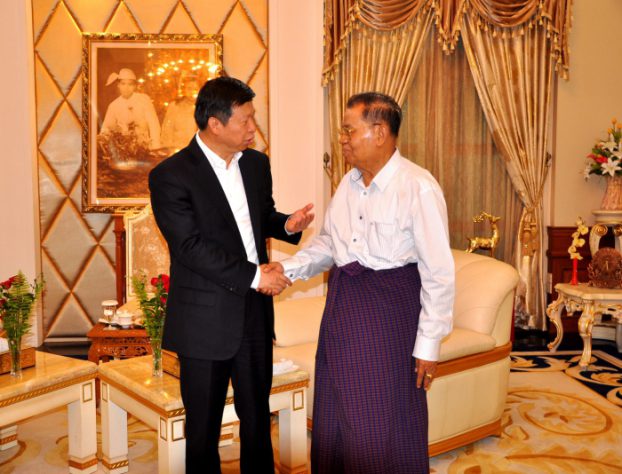A low-key visit to Burma last week by a senior Communist Party of China (CPC) official revealed that Beijing still sees the country’s former dictator as a “political force” in the country’s affairs more than five years after his retirement.
The visit last Thursday by Song Tao, the director of the CPC’s International Liaison Department, highlighted China’s keen interest in maintaining as many avenues of influence in Burma as possible, even as it prepares to welcome State Counsellor Aung San Suu Kyi later this week as the country’s de facto head of government despite her constitutionally ambiguous status.
Suu Kyi’s visit, set to begin on Wednesday, will be her second at the invitation of the Chinese government since one in June of last year, and her first since her National League for Democracy (NLD) won a landslide victory in elections held last November.
During his stay in Naypyidaw, Song met not only with Suu Kyi, but also with Senior General Min Aung Hlaing, the commander-in-chief of Burma’s armed forces, as well as former President Thein Sein, who is now the chairman of the opposition Union Solidarity and Development Party (USDP), and Shwe Mann, another former general who is currently serving as chairman of a parliamentary legislative oversight commission.
More surprising, however, was a meeting with Than Shwe, the former military strongman who ruled Burma for nearly 20 years, until he handed over power to Thein Sein’s quasi-civilian government in 2011.
The visit received little media attention, but attracted intense interest among Burma’s social media users after photos of Song and his entourage posing with the once-feared dictator looking healthy for his 80-plus years started appearing on Facebook.
On Saturday, Rangoon-based media outlet The Irrawaddy quoted a senior Chinese embassy official as saying that the meeting with Than Shwe was part of Song’s outreach effort in Burma.
“He paid a visit to U Than Shwe as he is having meetings with political forces in Myanmar during his trip,” Zhu Xianghui, the embassy’s second secretary, was quoted as saying.
While observers have long suspected that Than Shwe continues to exert some influence over the country’s political affairs, few foreign governments have so openly courted the approval of the onetime dictator, who cultivated close ties with China during Burma’s decades of isolation by the West.
The move appears to point to China’s ongoing concern about the fate of projects, such as the US$3.6 billion, Chinese-backed Myitsone megadam in Kachin State, that were approved under Than Shwe’s watch but are now facing an uncertain future under the NLD.
These projects, and Burma’s quest for Chinese investment in other areas of its economy, are expected to dominate Suu Kyi’s four-day visit.
[related]
While Than Shwe’s role in Burmese politics remains largely a matter of speculation, the Chinese government appears to have decided that it can safely treat Suu Kyi — who is constitutionally barred from assuming the presidency because her sons are foreign nationals — as the government’s real leader.
“Suu Kyi ranks as the country’s second figure after the president. Additionally, it is widely acknowledged that she works as the head of the government,” according to Jia Duqiang, a senior researcher of Southeast Asian studies at the Chinese Academy of Social Sciences quoted by the state-run China Daily newspaper.
Beijing is “likely to treat Suu Kyi with the etiquette afforded to a prime minister,” the newspaper added.



